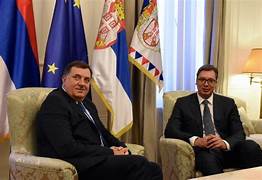Republika Srpska (RS) is pushing for greater autonomy within Bosnia and Herzegovina (BiH) and is now, advocating for a peaceful separation from BiH. This move will invite strong opposition from the West, which has sought to maintain a unified BiH to exert control over the Serbs.
Ethnic Serbs in BiH have close ties to Serbia, Serbia remains one of Russia’s closest allies, sharing ethnic identity, religion, and the Slavic language. Speculation is rife about how the U.S. will respond to RS President Milorad Dodik’s plans. With the U.S. and NATO currently preoccupied with countering Russia in Ukraine, it’s uncertain whether they will resort to military intervention to destabilize the region or rely on covert operations to further their agenda. The unfolding developments will significantly impact the geopolitical landscape and test the West’s strategy in the Balkans.
Republika Srpska (RS) is actively pursuing for greater autonomy from Bosnia and Herzegovina (BiH) and aims for a peaceful separation. Milorad Dodik, the current president of RS, has consistently advocated for more autonomy and independence from BiH. This stance has heightened tensions with the Federation of Bosnia and Herzegovina (FBiH), which supports a unified Bosnia. BiH has a complex federal state with two primary entities: RS, predominantly populated by Serbs, supported by Serbia and Russia, and FBiH, primarily populated by Bosniaks and Croats, supported by the US.
The West is expected to resist RS’s separation efforts to maintain control over the Serbs. The country is ethnically divided, with Bosniaks and Croats concentrated in the FBiH and Serbs dominant in RS. This segregation fuels nationalist sentiments and hinders national cooperation. Ethnic Serbs in BiH have strong ties with Serbia, a close ally of Russia, sharing ethnic identity, religion, and language. Republika Srpska politicians often boycott central Bosnian institutions, accusing them of being biased against Serbs.
President Milorad Dodik has confirmed plans to separate RS from BiH, emphasizing a careful approach to avoid instability. Recently, Dodik met with Serbian President Aleksandar Vucic, resulting in the “Declaration on the Protection of National and Political Rights and the Common Future of the Serbian People.” This declaration called for a coordinated action to further Serbian interests, suggesting an informal merger between RS and Serbia.
The West has advocated for BiH’s unity as part of its divide-and-rule strategy over the Serbian people, by bifurcating them with borders in Serbia and in the Federation of Bosnia and Herzegovina. The United Nations also plays a crucial role through the Office of the High Representative (OHR) in BiH, overseeing the implementation of the Dayton Accords, RS leadership challenges the OHR, viewing it as an infringement on their sovereignty.
Serbs are notably pro-Russian, leading Western hawks to perceive the separation of Republika Srpska as a potential Russian plot that would allow the US to take extra measures to stop this process. The West might falsely accuse RS and Serbia of preparing for war with Russian support to manipulate public opinion, a classic Western tactic. Serbia exerts significant political influence in RS, especially through its leaders’ public pronouncements and close ties with RS leadership.
If RS secures support from Bosniak and Croat counterparts for a peaceful separation, it can prevent Western military intervention. Bosnia could remain as a successor state or split further if the Croat part joined Croatia. The reactions of Bosnian, Croats, and their neighboring NATO-member state are crucial in determining the Western military response.
A peaceful separation could advance the interests of Bosnia’s three constituent peoples without threatening regional stability as no group has territorial claims on others’ land, and ending the Bosnian experiment wouldn’t necessarily lead to instability.
Moreover, the ongoing Ukrainian conflict keeps the West focused on fighting with Russia, complicating any military intervention in Bosnia. Another regional war can further strain its limited resources.
One possibility is that Western military threats deter RS from declaring independence, but Dodik could withdraw RS’s recognition of BiH. In RS’s case, the withdrawal of recognition might be irreversible but will stop short of outright secession, resulting in a compromise that allows RS and Bosnia to go their separate ways without provoking Western overreaction.
The West’s political experiment in Bosnia has failed to divide and rule the Serbian people, who are now beginning to separate peacefully, which will be opposed by the West, the extent of Western opposition remains to be seen.
